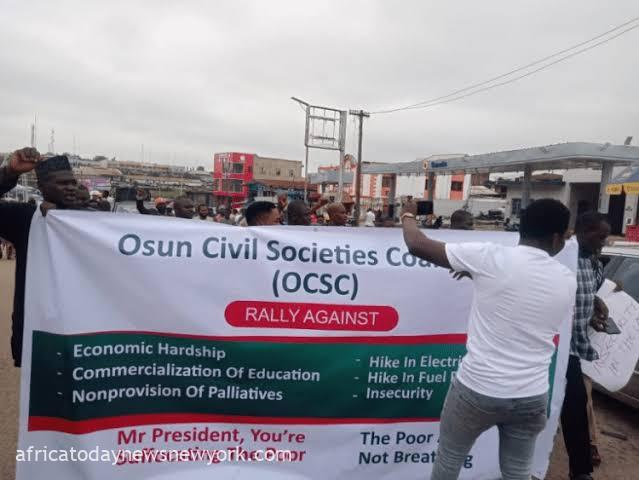Osogbo, the heart of Osun State, witnessed a surge of young protesters taking a stand against economic hardships and rising security concerns, as they took to the streets to voice their collective concerns.
The protest gained visual and auditory depth as participants brandished placards etched with messages, synchronized in solidarity songs that served as a poignant backdrop to their shared grievances and calls for an uplift in the living standards of the Nigerian people.
The assembly point at Old Garage marked the beginning of a coordinated march, with the protestors journeying through significant landmarks – Freedom Park, Orisunmibare, Ola-Iya, Alekunwodo, and concluding their demonstration in the Oke-Fia regions of the state capital.
A visible presence of armed policemen was maintained on-site, a precautionary measure to uphold law and order and forestall any attempts by hoodlums to exploit the protest for violent purposes.
The leader of the protesters, Comrade Waheed Lawal, lamented that the policies of the current government are anti-people and not aimed at ameliorating the sufferings of the masses.
“They must do whatever they need to do to make sure that the people benefit from the reforms. They promised us ‘Renewed Hope’ but what they are giving us now is renewed hardship, we reject renewed hardship in our lives, and in our economy because Nigerians deserve the best,” he said.
“What Nigerians want is a peaceful atmosphere. We don’t want insecurity in our land again because, with the state of insecurity in the country, you can’t travel from Osogbo to Ibadan with your mind at rest, you will be thinking you may be kidnapped.
Read also: Election Delay: Internet Shut Down As Protests Hit Senegal
“We have started this struggle today and if the government fails to listen to us, we will continue to mobilise our people to refuse this hardship because enough is enough,” he maintained.
In a sequence of collective action, their protest mirrored those in Minna, Niger State, and Kano, creating a cohesive narrative of activism resonating throughout the northern part of the nation.
Niger State became a focal point for activism as women and youths, forming the majority of demonstrators, barricaded a vital road in the state capital, Minna, urgently seeking help to cope with the increasing burden of living costs.
Tinubu’s tenure, commencing in May, has seen the abolition of the fuel subsidy and the removal of currency controls. This decision has translated into a tripling of petrol prices and a consequential surge in living costs, fueled by the steep devaluation of the naira relative to the dollar.
The meetings, which commenced on Tuesday, featured the notable presence and engagement of key officials, including the Ministers of Finance, Information, Budget and National Planning, and Agriculture. The National Security Advisor, Director of the Central Bank, and other senior aides contributed significantly to the discussions.
“By the time these meetings are concluded, we’ll be able to issue a definite statement on what the position of the government is in this regard,” Information Minister Mohammed Idris told reporters.
“All I can say is that discussions are ongoing, and very soon a solution is in sight for Nigerians.”

